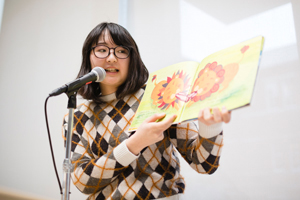Learning Characteristics
Based on the 5 pillars of: modern literature for reading and understanding masterpiece works since the Mejia Era, studying classical literature in historic Kyoto, Japanese culture that analyzes a wide range, from picture scrolls to manga and videos, Japanese linguistics that explore the characteristics of Japanese, and Japanese language education for practical learning of Japanese teaching techniques, we will develop people who can convey the charms of Japanese culture to the world.
Deepen learning of Japanese language and culture from 5 fields



Japanese Linguistics
Study and research the actual structure and usage of modern Japanese. These are the basics for studying Japanese language education.
Japanese Language Education
Japanese language education plays a part in international understanding. With a curriculum that follows the guidelines from the Agency of Cultural Affairs, students will practically learn the teaching techniques for conveying Japanese language and culture to foreigners.
Modern Literature
Covers Japanese literature from the Meiji Era to the present day. Students will deepen their appreciation for works of art while being thrilled by the novel’s surrounding area.
Classical Literature
Learn about works from various angles from the myths, classic Japanese poems, stories, picture scrolls, essays, narratives, novels, and haiku collections compiled over the last 1200 years, from ancient times to the present.
Japanese Culture
We will cultivate the ability to properly understand and properly analyze various ancient and modern Japanese cultures that have a deep connection with Japanese literature, and the ability to enjoy their attractiveness.
Courses of Interest
Japanese Linguistics
Japanese Voice
Students will gain the basic knowledge and analytical abilities regarding Japanese voice and phonology, such as Japanese accents and intonation.
Using Japanese
Students will learn about how to research changes in Japanese pronunciation, vocabulary, and grammar through explanations that utilize real-life examples that explore the diversity of words, such as “yabai” and “zenzen” in Japanese.
Japanese Language Education
Japanese Language Education A / B
Students aim to become Japanese language instructors while experiencing teaching Japanese to foreigners. They will accumulate over 20 hours of Japanese guidance experience at designated overseas universities and institutions both on and off campus.
Japanese Teaching Methods A / B
Students will learn about the instruction process, and teaching materials and tools for early and mid-stage Japanese language education. They will form small groups and engage in simulated instruction between instructors and learners.
Modern Literature
Modern Literature Lecture A - D
Dig into the secrets of the works of famous writers such as Soseki Natsume, Junichiro Tanizaki, Ryunosuke Akutagawa, Osamu Dazai, and Yasunari Kawabata, as we explore the charms of masterpieces from the Meiji Era to the present.
History of Modern Literature A / B
An appreciation of works, with broad study of modern literature focused on the Meiji and Taisho eras. Consider the attractiveness and significance of art, and learn about the characteristics of Japanese literature.
Classical Literature
History of Classical Literature A / B
Deepen the knowledge and understanding of the geographical and cultural background that led to the creation of works while appreciating exemplary literary works.
Reading Classical Literature A / B
A detailed reading of the primary classical literature of the Heian period – “The Tale of the Bamboo-Cutter”, “The Pillow Book”, and “The Tale of Genji”.
Japanese Culture
History of Japanese Culture B
Consider how Japanese culture is perceived from the works of a representative Japanese film director Yasujiro Ozu, and consider what “Japanese” meant to him.
Fieldwork
Taking advantage of the location of the Imadegawa Campus, take strolls through the city of Kyoto and study locally while learning about the basic knowledge for Kyoto’s history and culture.





















